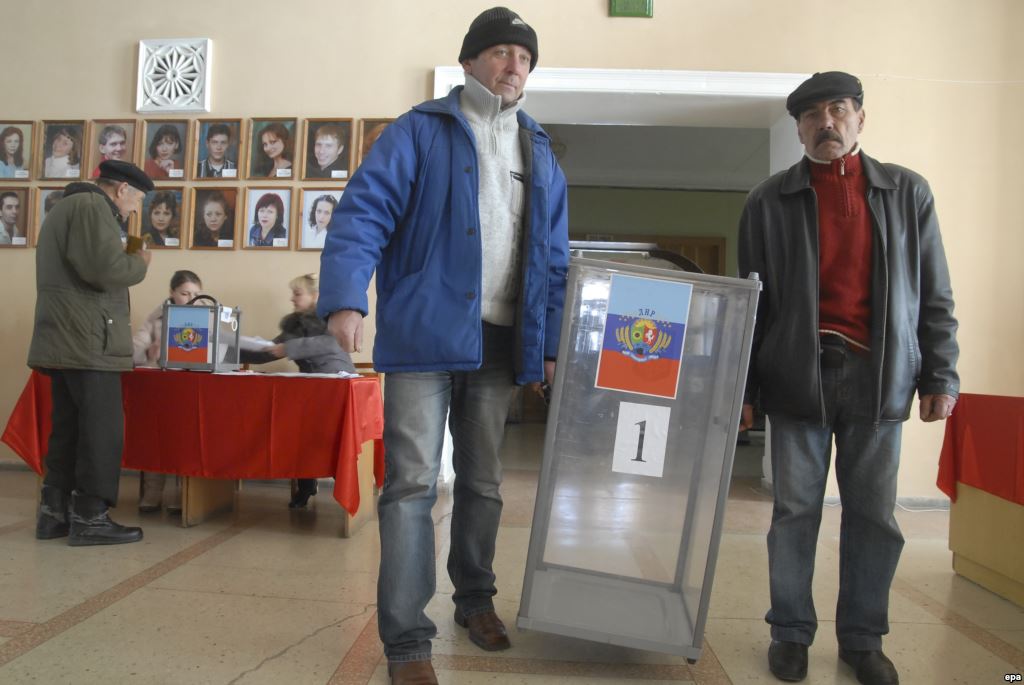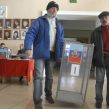
Donetsk, Luhansk ‘People’s Republics’ Seek International Legitimization Through Local Elections (Part Two)
Publication: Eurasia Daily Monitor Volume: 12 Issue: 97
By:

*To read Part One, please click here.
The armistice signed in Minsk on February 12, 2015, (Minsk Two agreement) opens the way for staging local elections in the Donetsk and Luhansk “people’s republics” (“DPR, LPR”) and the possible validation of those elections’ outcome by the Organization for Security and Cooperation in Europe (OSCE). This scenario, if carried out as proposed against Ukraine, would be an unprecedented one in the 25-year history of Russia’s conflict undertakings in former Soviet territories (“frozen” conflicts). It would, for the first time, lend the appearance of international political legitimacy to secessionist leaderships armed and controlled by Russia (see Part One in EDM, May 22).
On May 13, the “DPR” and “LPR” jointly presented their proposals on the modalities of conducting those local elections, to Ukraine’s Verkohvna Rada and to the participants in the Minsk Contact Group (Ukraine, Russia, OSCE) (Donetskoye Agentstvo Novostey, LuganskInformTsentr, May 13).
Apart from its title, the proposed law stops short of referencing the “people’s republics”; instead, it uses the terms “certain areas of the Donetsk and Luhansk oblasts [provinces],” in line with the Minsk agreement’s terminology. Their proposals are framed as a legislative initiative, titled “DPR-LPR’s draft of a law of Ukraine on the special features of holding local elections” in these territories. The Verkhovna Rada is supposed to adopt, and President Petro Poroshenko to promulgate, such a “law” (a blank space is even reserved for Poroshenko’s signature). However, the unrecognized DPR-LPR have no right of legislative initiative in Ukraine (they currently seek such a right with Russia’s support through changes to Ukraine’s Constitution).
These election process shall be administered by temporary electoral commissions, formed locally by the secessionist authorities, “in accordance with the OSCE’s standards.” The OSCE’s Office for Democratic Institutions and Human Rights (ODIHR) “and other international organizations” (unnamed) shall monitor these “elections.” If so, the OSCE would monitor and potentially validate a secessionist election for the first time ever, instead of refusing to monitor it as the OSCE has always done. Those refusals, moreover, adhered to the OSCE’s usual practice of monitoring country-wide elections, not local elections. Making an exception for the “DPR-LPR” might be construed as treating these as would-be states.
Under this “draft law,” parties and political blocs may neither run nor enter candidates in these elections. This provision would exclude Ukrainian parties from participating. Only individual candidacies are eligible to be registered by the electoral commissions.
Candidates must have resided in “DPR” or “LPR” localities for at least ten years, including at least one year immediately preceding the elections. This residency requirement is intended to disqualify politicians of the former Party of Regions who have fled from the “DPR-LPR” to Ukrainian-controlled territories. That party and its component factions used to control the Donetsk and Luhansk provinces (collectively known as the Donbas region) until Russia’s proxies took over in the spring of 2014, wielding, in part, anti-“oligarchic” slogans. The most prominent survivors of the old Donbas regime are currently in Kyiv, affiliated with the Opposition Bloc in the Verkhovna Rada. The Opposition Bloc and its candidates won the elections held in the liberated parts of the Donetsk and Luhansk provinces in October 2014, as part of Ukraine’s parliamentary elections. The “DPR-LPR” evidently intend to preclude a comeback of that former nomenklatura to the secessionist-controlled territory.
Local registered voters who are currently residing “beyond Ukraine’s border” would be voting at their current place of residence. This would mean hundreds of thousands of ballots being cast on the territory of Russia, beyond the oversight of Ukrainian or international electoral authorities.
Mass media outlets deemed to “intentionally spread unreliable information about the situation (in these territories)” shall not be accredited to cover these elections by the electoral commissions.
The “draft law” includes an itemized list of localities where these “elections” would be staged. The localities include: a) those seized by Russia’s proxies beyond the Minsk One armistice line (the shift of which was ratified by the Minsk Two armistice); b) Debaltseve and nearby towns, captured beyond the Minsk Two armistice line (as tacitly accepted by Germany and France in the “Normandy” forum); and c) Peski and Shyrokyne, two key Ukrainian outposts to which the “DPR” lays claim.
Such elections, if staged, look pre-programmed for the “DPR” and “LPR” to win. Ukraine has built some legal safeguards against the consequences of such elections. Under legislation initiated by President Poroshenko and adopted by the Verkhovna Rada on March 17, any elections in the occupied territories may not be deemed valid until illegal armed forces have left Ukraine’s territory and Ukraine has regained control of its side of the Ukraine-Russia border. Furthermore, those elections may not be deemed valid unless conducted under Ukraine’s electoral law, Ukrainian parties compete there in a level playing field, and mass media have full access to inform voters and to cover the elections. Moscow and “DPR-LPR” retort that Ukraine adopted that law “unilaterally,” instead of negotiating it with Donetsk and Luhansk in the spirit of the Minsk process. They want Ukraine to revoke the March 17 legislation with its safeguards (Interfax, May 13).




